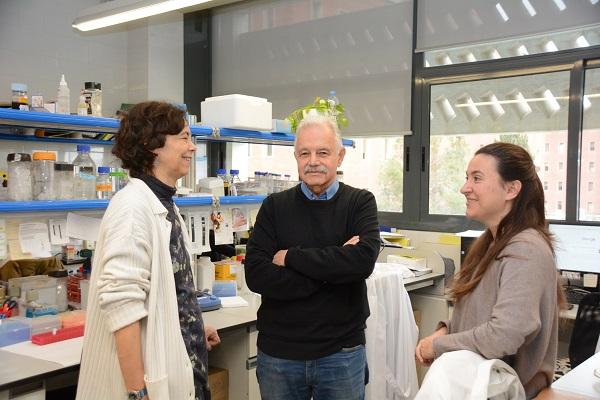Expanding the clinical phenotype of patients

Credit: UNIVERSITY OF BARCELONA
A research team has described five new cases of a rare disease -known as KAT6A syndrome- of which there are only eighty dominant cases worldwide. This neurological and developmental disorder, caused by alterations in the lysine acetyltransferase 6A gene (KAT6A), involves intellectual disability, language impairment, low muscle tone, cardiovascular malformation and eye defects, among other affectations.
The study, published in the journal Orphanet Journal of Rare Diseases, is led by a team co-led by the researchers Daniel Grinberg and Susanna Balcells and Roser Urreizti, from the Human Molecular Genetics Group of the Faculty of Biology of the University of Barcelona and the Rare Diseases Networking Biomedical Research Centre (CIBERER), and the experts Estrella López-Martín and Eva Bermejo-Sánchez, from the Institute of Rare Diseases Research (IIER) from Carlos III Health Institute (ISCIII).
KAT6A syndrome: news symptoms related to a rare disease
The research team confirmed in five new patients some of the features of the clinical picture related to the pathology, apart from describing new symptoms and affectations in the development of the disease. In particular, the authors overserved new symptoms such as cryptorchidism (testicular atrophy), syndactyly (fused fingers) and trigonocephaly (deformation in the frontal part of the cranium), apart from the emergence of recurrent infections.
The experts from the Human Molecular Genetics Group of the UB, also members of the Institute of Biomedicine of the University of Barcelona (IBUB) and the Research Institute Sant Joan de Déu (IRSJD), contributed to specifying the role of genetic mutations that were seen in this minority disease. Despite the syndrome was first related to truncating mutations, the new study describes a variant of the disease without cardiac affectations that is related to missense mutations.
Four out of the five patients described in this study showed missense substitutions, and the fifth case they observed a missense mutation that did not follow cardiac affectations.
The in silico studies -with informatic simulations- confirmed that the missense mutation generated a partial process of splicing that caused the premature truncating of the protein that gave origin to the pathology.
The new study will contribute to better understand the natural history of this syndrome and expand the clinical phenotype of patients, advances that are essential to delimit the phenotypical characterization and definition of this rare disease. According to the authors, these findings will help to increase the chances to diagnose other affected patients earlier. Other participants in the study are experts from the Hospital del Mar Medical Research Institute (IMIM), Hospital de la Fe (Valencia) and the University of Adelaide (Australia).
###
Media Contact
Rosa Martínez
[email protected]
34-934-031-335
Related Journal Article
http://dx.




